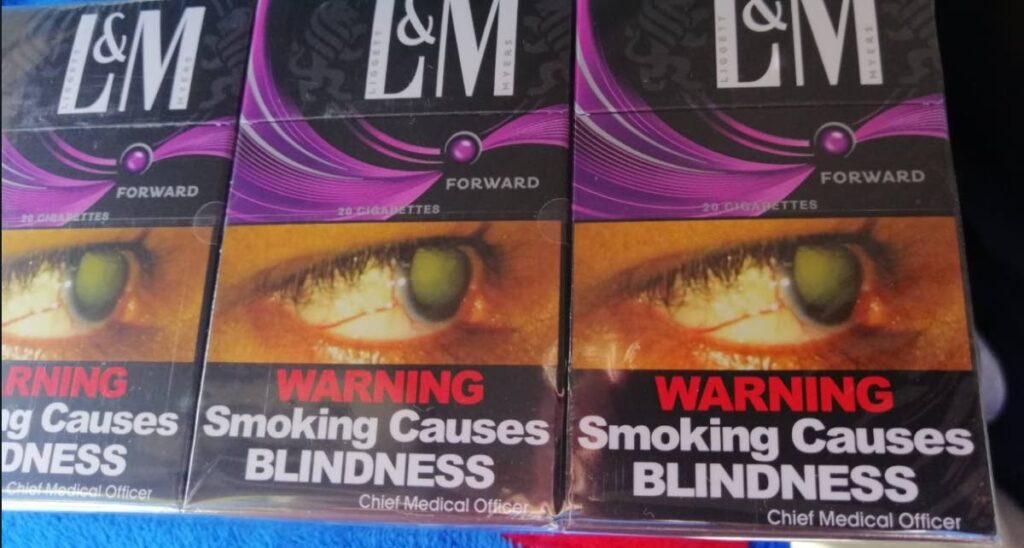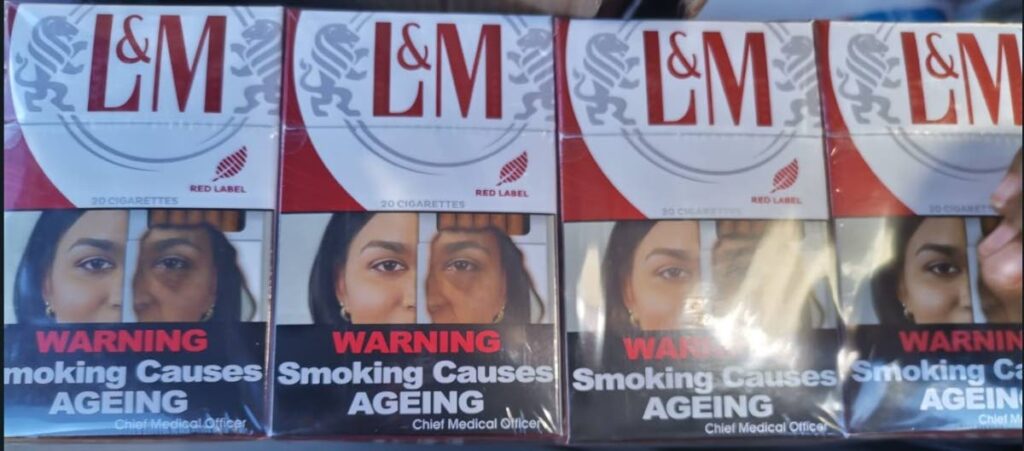Business
Ria Chaitram
With over 200,000 legal-aged smokers in TT, cigarette company Philip Morris International (PMI) is seeking to replace tobacco-based cigarettes with smoke-free products.
Speaking with Business Day, PMI country manager for TT and the Caribbean Sheldon Wood said the thrust was scheduled to happen over the next two-five years, once the regulations, scientific approvals and other necessary operating documents were finalised.
Although it makes tobacco products, the company has pivoted to make them safer to use.
“PMI is looking to move into a smoke-free future. Combustible or traditional cigarettes, as we know it…have harmful effects due to the combustion of tobacco. When the tobacco heats to a certain temperature it combusts and causes a lot of the complications that you hear associated with smoking.
“Through our extensive research and science, that has been substantiated by data and all these findings, we are essentially looking to transform ourselves into a company that would sell reduced-risk products. These are products where the tobacco does not combust, so not having that combustion will result in not having expulsion of harmful toxins that cause complications associated with regular combustible tobacco.”
He added that the data was open for review because the company believed in transparency to ensure its markets and in countries in which they operate, there was no manipulation of the findings to create a smoke-free product.
“We have made the data (available) for anyone to challenge and scrutinise, so that if and when we do encounter people who have different perspectives, we welcome the dialogue.”
Wood, 44, has worked for the company about four years. His previous portfolios included several top-tier positions in marketing, sales, and other commercial roles at Carib Brewery, Nestle and Colgate/Palmolive.
He said it was the PMI’s vision globally and the transition has been more advanced in some countries, but it was expected to be introduced in TT and the Caribbean by 2024.

“It is all with the intention of giving people, or legal-aged smokers who make the conscious decision to continue to smoke, an option that is not as harmful. It is not without its risks – I am not trying to say there aren’t any risks – but the risks are significantly reduced.”
Wood said PMI was in discussion with several local stakeholders such as the ministries of Health, Trade and Industry and Finance (Customs and Excise) before the smoke-free products were introduced to the TT market. He was unable to give details of the companies undertaking the research on its behalf.
A report in the Financial Times questioned PMI’s smoke-free nicotine products which it claimed did not sit well with experts and was yet to satisfy them on health issues. It pointed out that the company’s flagship brand IQOS e-cigarette has not yet been approved in the US.
The report cited Dr Stanton Glantz, a tobacco specialist at the University of California San Francisco who said, “The most fundamental observation about IQOS is that if you take [Philip Morris’s] data, it doesn’t support their claims that IQOS is better than cigarettes. The IQOS device works by heating up tobacco to a lower level than conventional cigarettes. Traditional tobacco products when lit reach temperatures of about 600 degrees Celsius, while Philip Morris’s website said IQOS heats the tobacco to 350 degrees Celsius.”
The article added that the Glantz research showed that heated tobacco products still release particles that transmit nicotine into the lungs and there were differences in the use of IQOS and normal cigarettes.
According to the PMI website more than US$8.1 billion in the research, development, scientific substantiation, and manufacturing capacity has been invested in the smoke-free product since 2008.
PMI brands in TT are L&M and Marlboro, and it also manufactures associated electronic devices and accessories, and other nicotine-containing products distributed by Micron Marketing Ltd. Its tobacco is grown and products manufactured in Mexico and the Dominican Republic.
Pricing of the product, Wood said, has not been determined because of several factors including the market, duties, taxes, and levies. He pointed out that cigarette companies like PMI operating in international markets do not receive any breaks on taxes or import duties. He said because of these non-exemptions, PMI has been a contributor to the local economy.
“Our product is manufactured externally, so from a manufacturing perspective we (TT) do not benefit. Our local distributor has resources that have been hired specifically for the growth of PMI business. So we do impact (local) employment to some extent, because with our distributor we obviously have teams that they would have had to employ to then be able to achieve our commercial agenda.

“We do have an impact on the local economy and because our product comes from the Dominican Republic and Mexico, the reality is that there is an import duty that has to be paid. Those countries are not part of Caricom or any Caricom treaties, and as result of that, we pay high import duties, which become revenue to the Government.”
Additionally, PMI is undertaking a new graphic health warning, which it expects would help curb the trade in illicit tobacco products. The repackaging is in keeping with the Ministry of Health’s policy that the packaging of cigarettes and tobacco products clearly state the health warnings and requisite approvals.
PMI, Wood said was working closely with the Tobacco Control Unit (TCU) in this process.
“They (TCU) have been stating for a quite a number of years that they would be implementing a new graphic health warning which would take over from the existing health warning, where there was just text. In March 2021 they informed us that we had until March 2022 to be in full compliance with the new health warning.
Wood said in a previous statement that, “The company believes that this policy also will help our trade partners and legal-aged consumers to identify illicit products as they would not have graphical health warnings that comply with Ministry of Health guidelines. The local authorities can now use this element to effectively seize illegal brands and apply the relevant sanctions to discourage illicit cigarette handling.”
Minister of Trade and Industry Paula Gopee-Scoon last year said $30 million in tax evaded on illegal cigarettes constituted about five per cent to ten per cent of the local market.
She said then, “It is so much of a threat to manufacturers. The reason we have to focus on this illicit trade (is that it) undermines public health, it contributes to tax evasion and creates a non-level playing field.
“We have come up with a comprehensive action plan to strengthen the regulating agencies which we will take in the form of a cabinet note. It will be largely about strengthening the capacity of the regulatory and enforcement agencies to detect this illicit trade and of course enforce the necessary penalties.”
Like many other companies, Wood pointed out, PMI has had its share of operational hiccups because of the covid19 pandemic, but was able to remain on the market, since tobacco products were not affected as badly as other areas.
He said there was no intention for PMI to raise the prices of its product in the short term, and it was able to maintain its staff complement, maintain business efficiency, and maintain its pricing structure since the start of covid19 in 2020.
“Freight rates have gone up astronomically (since) 2020, and as long as it is sensible from a commercial standpoint, we will try to become more efficient in our business processes to absorb the cost and not have to pass it to our trade partners and customer.
“We have been in a fortunate position, and we are not looking at letting go anybody. As a matter of fact, the company globally said it would not be reducing the headcount, not during the pandemic. (As) for PMI TT, we actually increased staff during the period.”
Wood said the company continued to ensure safety was a key priority for its workers globally and encouraged sanitisation, washing of hands, wearing masks and vaccinations.
“We make sure our teams have all the protective equipment such as masks, hand sanitisers. We take it seriously and it has impacted the way of working not just for us, but for the entire world, and we just have to adapt.
“We have leveraged the use of technology for remote meetings, as much as is humanly possible. Travel has to go through extensive approvals, because it should be on an as-needs basis.”
Having been directly affected by the pandemic, Woods urged people to observe the health protocols and address concerns that may affect mental health.
Woods also encouraged businesses to stay true to their values of their brands and what they are about.
